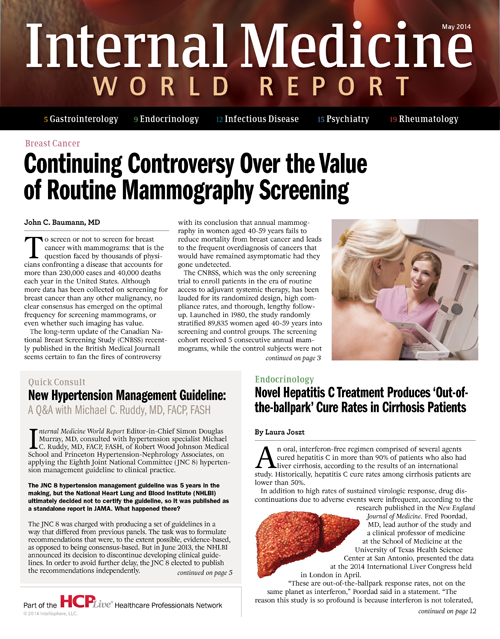Publication
Article
Internal Medicine World Report
In Unruptured Brain Arteriovenous Malformations, Conservative Management Outshines Interventional Treatment
Author(s):
Among patients aged 16 years or older with unruptured brain arteriovenous malformations (AVMs), conservative management produces better clinical outcomes than any endovascular embolization, neurosurgical excision, or stereotactic radiosurgery.

Among patients aged 16 years or older with unruptured brain arteriovenous malformations (AVMs), conservative management produces better clinical outcomes than any endovascular embolization, neurosurgical excision, or stereotactic radiosurgery, according to research published in the April 23/30, 2014, issue of the Journal of the American Medical Association.
For their study, Rustam Al-Shahi Salman, PhD, of the Centre for Clinical Brain Sciences at the University of Edinburgh, and colleagues prospectively followed 204 brain AVM patients in Scotland — 103 of whom underwent an intervention — for 12 years. The researchers performed Cox regression analyses with multivariable adjustment for prognostic health factors and baseline imbalances to compare the rates of death or sustained morbidity of any cause, as well as nonfatal symptomatic stroke or death due to brain AVM, associated arterial aneurysm, or intervention.
According to the study authors, the unruptured brain AVM patients who underwent an endovascular embolization, neurosurgical excision, or stereotactic radiosurgery alone or in combination were “younger, more likely to have presented with seizure, and less likely to have large brain AVMs than patients managed conservatively” with no intervention. During a median follow-up period of 6.9 years, the rate of progression to the aforementioned primary study outcomes was lower with conservative management during the first 4 years of follow-up, although the rates were similar thereafter. The rate of nonfatal symptomatic stroke or death due to brain AVM, associated arterial aneurysm, or intervention was also lower with conservative management during 12 years of follow-up.
In light of that evidence, the researchers concluded “use of conservative management compared with intervention was associated with better clinical outcomes for up to 12 years” among patients aged 16 years or older diagnosed as having unruptured brain AVM. However, they noted a longer follow-up period is needed to ensure the association persists long-term.






